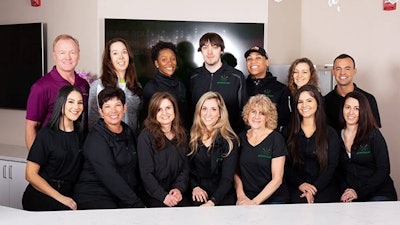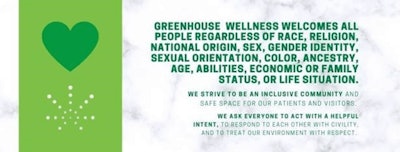
Greenhouse Wellness, a medical cannabis dispensary in Ellicott City, Maryland, hires many employees based on backgrounds working in health—but also if they’re kind. That’s what Gina Dubbé, CEO and lead investor, and Dr. Leslie Apgar, co-founder and medical director, told writer Jolene Hansen for Cannabis Dispensary’s January/February issue cover story.
The dispensary was ranked No. 1 in Cannabis Dispensary and the Best Company Group’s “Best Companies to Work For – Dispensaries” awards program. Greenhouse Wellness answered in responding to the “Best Companies” survey that it employs practices to recruit and retain employees from different ethnicities and cultural backgrounds.
RELATED: You can find Greenhouse Wellness’ “Best Companies” profile here and all the other “Best Companies” profiles here.
We spoke with Dubbé about why she values diversity as part of Greenhouse Wellness’ “culture of kindness” and the policies the company has in place to help promote it. Leading up to our conversation, she sent us Greenhouse Wellness’ diversity statement.

Cannabis Dispensary: You sent us the diversity statement for Greenhouse Wellness, and you said that you live by that. Why is diversity important to the company?
Gina Dubbé: I have two adopted children, both of which are transracial, and so to me, being diverse is just a part of life. And in fact, it shocks me that anybody would look at it differently.
CD: Greenhouse Wellness was started and is owned by two women, and it markets largely to women. Do you feel women have been underrepresented in the cannabis space, and what do you think the industry could do to get more women involved?
GD: That's a hard one. I do think women are underrepresented. In Maryland, [there is a lack of] female owners. Many of the dispensaries tout the fact they have females on the board or as part of the investment group, but they're a minority part of that investment. I think it is very hard, given that much of the discretionary cash is male-based, to get a woman to come out of her comfort zone to jump into cannabis. I know that that was tough for us, too. But as things become more inclusive, it will be easier.
CD: What do you feel like companies can do to make themselves more inclusive when it comes to hiring and retaining employees—either things you're doing or just in general?
GD: Goldman Sachs … said that they will no longer take a company public if a woman isn't on the board of directors ... There has to be at least one woman on the board of directors on any company they take public or they won't take you public. So, I think we're seeing a sea change. We are seeing a real push towards—I won't say 'equality' because one woman on a board of 12 isn't equal. But we're seeing progress.
CD: Greenhouse Wellness wrote in a response to our “Best Companies to Work For survey” that the company offers an unlimited number of personal days after employees have worked there for a year. Another survey response said employees can donate accrued PTO or other time off to fellow employees in need. Can you explain the rationale behind those practices and how those might help those employees who have different cultural norms or experiences or are marginalized?
GD: What's most interesting—we did this Today Show segment, which you can find on our website, and one of the people that they interviewed was Lauren, who works for us now, but suffered from a terrible disability where she couldn't work at all. If we impose the same rules on her as we might have done in the past, she would never be able to work. But [employees can benefit] by [us] saying—and by us investing and maybe carrying a little bit more overhead and a little more people on a daily basis—'If you're sick don't come in. We want you to be healthy, we want you to be well. If you need a day off, fine, take your day off.’ I have someone in Africa right now going on her third big vacation of the year. That's great by me because she comes back incented to work more and harder and really in heavy support of the business. I think just being responsive to people's needs—it's just a part of life, and truthfully, as women, a part of motherhood. It's just a nurturing component that we want to give to our employees.
CD: In response to the survey, Greenhouse Wellness also said it helps employees work on self-development and provides them with unlimited vacations and a familial atmosphere. You just touched on the vacations part. But how does that type of culture help promote a diverse workforce?
GD: I think we want everyone that works for us to be thinking of the long term for themselves. We want them all to be entrepreneurial. So, you hire people with different worldviews and different desires. We bring in an accounting professional to show people how to start their own business, a marketing professional to show people how to do their website, another accounting professional coming in in March to teach the staff how to set up a business plan and to look at overhead and look at cash flow. ... The smarter they are at business, the better off I am, because they're going to go on and do great things, and I'm going to be cheering for their success. And while they're with me, they're learning. It's just a win-win for both sides.
CD: Is there anything else that you'd like to add about the importance of hiring and retaining minority employees or employees from different cultural backgrounds?
GD: As the mother of two minorities, I think it's so important to me on a personal level because I have the United Nations at my dinner table every night. And that's what I want to work with. I want all the different opinions, I want people to be able to know they're accepted, even though we might disagree on things. It's just the right place and the right culture to have in a business these days.











.png?auto=format%2Ccompress&fit=crop&h=141&q=70&w=250)














